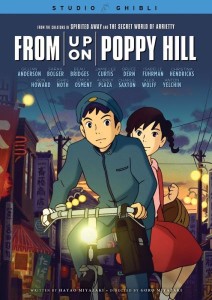JQ Magazine: DVD Review – ‘From Up on Poppy Hill’

“Studio Ghibli films are known for their fantastical animation and surrealistic landscapes. However, Poppy Hill lacks one other crucial element common to Ghibili films: an emotional depth of feeling.” (GKIDS)
By Lyle Sylvander (Yokohama-shi, 2001-02) for JQ magazine. Lyle is entering a master’s program at the School of International and Public Affairs at Columbia University (MIA 2013) and has been writing for the JET Alumni Association since 2004. He is also the goalkeeper for FC Japan, a New York City-based soccer team.
From Up on Poppy Hill is the latest film to be released from Japan’s famed Studio Ghibli. Unlike its more prominent titles, this one is not directed by studio founder Hayao Miyazaki (Spirited Away, Howl’s Moving Castle) but rather by his son Goro Miyazaki. The father did, however, co-write the script (with Keiko Niwa), which was adapted from a manga published in the 1980s. Goro’s first film, Tales from Earthsea, was a commercial hit but received a very negative reception, even receiving “Worst Director” and “Worst Picture” designations from the Bunshun Raspberry Awards, given annually to the worst in cinema by the Bungeishunju Publishing Company. From Up on Poppy Hill received a much better reception (although many reviews were mixed) and became the highest grossing Japanese film of 2011 and won the 2012 Japan Academy Prize for Animation of the Year.
The story takes place in Yokohama in 1963, a pivotal point in Japan’s history as the country was preparing for the 1964 Tokyo Olympics. The nation was on the economic upswing and the Olympics were meant to showcase the “new” Japan as it pushed its postwar ruin firmly into the past. Within this context, Poppy Hill tells two stories, both of which deal with historical consciousness. The first concerns a high school student named Umi, who lives and works in her family’s boarding house. Her father was lost at sea during the Korean War and Umi flies nautical flags daily from her house in order to wish peace upon all sailors. The second story concerns a clubhouse (named the Latin Quarter), which has been slated for demolition to make way for an Olympics-related building. The building is adjacent to Umi’s high school and she meets Shun, the leader of the clubhouse, who also happens to have been decoding her nautical flags each morning. Umi leads an effort to clean up the clubhouse and soon starts to fall in love with Shun.
Studio Ghibli films, particularly those of Miyazaki Senior, are known for their fantastical animation and surrealistic landscapes. One thinks of the imaginatively drawn worlds and characters of Spirited Away, Howl’s Moving Castle, Nausicaä of the Valley of the Wind and My Neighbor Totoro, among many others. The fact that Poppy Hill’s story and visual design lack this quality should not, by itself, denote a weakness in the film. However, Poppy Hill lacks one other crucial element common to Ghibili films: an emotional depth of feeling. Unfortunately, there is little in the film to attract and compel the viewer’s attention.
The one exception is a dream sequence wherein Umi is reunited with her father and one wonders if Goro Miyazaki could have pulled off his father’s penchant for expressing emotional beauty within an unbounded visual imagination. The rest of the film feels like an unhappily restrained television drama replete with stilted dialog and a stagnant plot. While there are aesthetically pleasing designs of old Yokohama, including Yokohama Bay, Yamato and Yamashita Park, there is no clear reason why this story was animated at all. A late plot twist, where the two young students’ love affair is potentially threatened by Shun’s mistaken belief that they share the same father, comes off as unnecessarily confusing. Finally, the two plotlines’ easy conclusions are unsatisfying due to their maudlin predictability.
According to Hayao Miyazaki, the original manga is more overtly political than the film version. Japan in the 1960s was an ideologically charged place, where rising youth movements protested the U.S. security arrangement and the political establishment’s close cooperation with big business. The manga did not skirt these issues and had also hinted that Umi’s father had been a kamikaze pilot in World War II. Against this backdrop, the parallel stories involving the past (Umi’s father’s death) and building for the future (the Latin Quarter’s demolition) may had more dramatic resonance. The tension between the characters at the micro level would have more clearly reflected the challenges Japanese society faced at the macro level. Perhaps a live action film more faithful to the source material would have been a more successful endeavor.
From Up on Poppy Hill is available Sept. 3. To view the official trailer, click here.


Comments are closed.